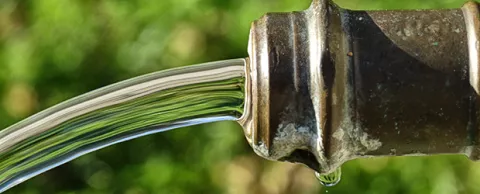
Between drought, pollution and population growth, water is the new gold in many cities. If you can’t easily find more, then you have to get citizens to use less. How do you do that? Give them precise information about how much they are using and when. Read on to learn how a smart solution from Itron has nearly doubled water conservation in Southhampton and other UK cities. — Jesse Berst
When there’s more people and less clean water, the only solution on the table is to use less. And several cities in the UK have unlocked the secret to making conservation nearly twice as effective: precise usage measurements.
Council Lead Partner Itron has been working with Southern Water to roll out smart water meters in south and southeast England, bringing precise billing to Southampton and other cities. The utility credits advanced metering with saving 27 million liters of potable water each day.
And Southern Water says it’s sure the meters are what’s making a difference. Customers with meters have cut their water use by nearly 17% — a far bigger decline than the national average of 10%, which includes people who have only heard the message to conserve.
Savings are practically instantaneous
Perhaps more surprising, people with advanced meters make more of an effort to conserve even when it doesn’t make a difference on their water bills. Researchers found usage dropped almost immediately after the meter was installed, even though it wouldn’t affect their bill for three months or more.
The study of 200,000 households found average reductions of 37 liters per day by the second month after installation, still well before there was a financial incentive to conserve. By the third month, reductions reached 50 liters per day per customer.
Residents conserved even more after financial incentives kicked in. Two years after advanced meter installation, the typical household was using 70 liters less water per day.
In the study, it’s not clear exactly why the meters caused people to change their behavior. It may be because they want time to develop good conservation habits so they’re ready when it would affect their bill. It also may be that the process simply prompts them to think more about something they’ve never really thought about.
A focus on education
While higher bills are certainly a threat, nearly two-thirds are paying less. And Southern Water made a concerted effort to help people prepare.
Meters have been rolled out over a five-year period — the last are being installed right now — and the very first customers were given a grace period of up to a year. Among those customers, they would pay the bill that resulted from precise measurement or what they paid under the old system a year earlier, whichever was cheapest.
Bills also provided more information about their actual water use and provided suggestions to help them make cuts.
More stories …
Thirsty yet? How 3 inspiring cities are preparing for the looming water shortage
How cities are making every drop of water count
Why outage management systems are good for water utilities



